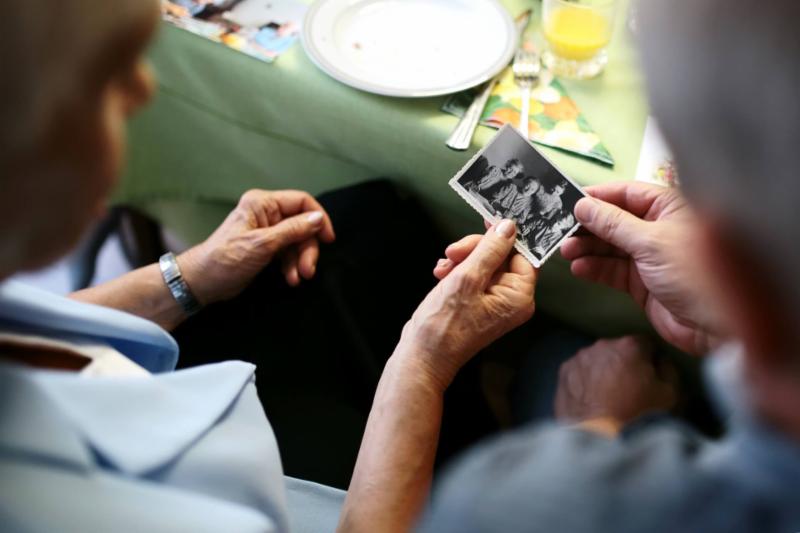| Caregiver Cottage Programs | |
|
|
|
Our newsletter is filled with information on some of the wonderful programs and services we offer to caregivers of individuals with Alzheimer's disease, dementia or other memory impairment.
As always, our team is here to help ~ whenever you are ready to reach-out!
|
Benefits of Care Management During a Pandemic
|

Benefits of Care Management during the Pandemic
Since March, our senior citizens, either living at home or in facilities have been isolated due to fear of contracting COVID-19. This isolation and loneliness have led to an increase in depression and decrease in cognitive functioning for many.
There is significant evidence that loneliness and isolation increase the risk for premature morbidity in the elderly population. Social distancing measures present important challenges to the health and well-being of older adults, particularly those who are frail, very old, or have multiple chronic conditions. Family members who are concerned about their loved ones may benefit from Care Management, especially if they live far away.
Our Care Managers are experienced in working with the Geriatric population and can provide visitations while wearing appropriate PPE, to combat the depression, loneliness and potential cognitive decline that accompany social isolation. These visits can be done for those living at home or in facilities while still maintaining social distancing and recommended safety precautions.
Many older individuals are lacking the cognitive stimulation necessary to help prevent or lessen memory loss and cognitive decline. Care Managers can provide cognitive stimulating and meaningful engagement for seniors that will result in increased memory and cognitive performance. Other assistance can be provided by providing grocery shopping and other errands for seniors who are afraid to go out due to fear of contracting COVID-19. Older individuals are at increased risk from serious complications from the virus and may lack resources to fulfill their needs while maintaining social distancing.
Care Management can also provide oversight, coordination and integration of services across the continuum of care for seniors. Older individuals with complex illness face a bewildering array of specialty and primary care providers, as well as potential home and long-term care services and supports. Coordination of medical appointments, medication management, advocacy and assistance with bill paying are just some of the additional benefits of having a Care Manager. T
These issues are becoming increasingly complex during the pandemic with many appointments being conducted by Telehealth, Zoom and other methods involving technology that may be confusing for older adults. Having a Care Manager providing oversight and assistance during this difficult time will provide the family with the peace of mind that their loved ones are being taken care of and are maintaining the highest quality of life possible.
With warmest regards,
Dawn Epstein
Executive Director
|
 |
|
Counseling by Licensed Psychotherapists
|

The Alzheimer's Care Resource Center offers psychotherapy and counseling services through licensed psychotherapists experienced in working with those living with, and caring for, someone with Alzheimer's disease, dementia or other neurocognitive disorder.
The decision to seek counseling is an important step. Too often, people don't get help because they feel ashamed, guilty, or embarrassed. By deciding to get help, you make the choice to feel better and improve your life.
Counseling services should be chosen with care so that you find something that best meets your needs. Working with a trained mental health care provider, you can develop the right treatment plan; learn good coping skills and better manage communication, stress and anxiety.
Medicare and Private Pay Accepted. To learn more, call (561) 588-4545.
|
 |
| Activity Ideas for Aging Seniors |
If you are a family member caring for an aging loved one at home, then you may be looking for some entertaining activities you can do with them. This blog will give you some quick ideas. Activities such as conversations and arts and crafts are crucial for mental stimulation, and they can also be a great and healthy way to use time. If your loved one has a degenerative neurological disorder, you may have to provide the accommodations for them and modify these activities. You may even have to set a time limit for certain activities if necessary. Choosing an activity that your loved one will enjoy will depend on their preferences. If you know your loved one well, then choosing one will be easy!
1) Exercise and going outdoors:
 If your loved one can walk comfortably, then going for walks outdoors is one of the greatest things you can do. Even if they must use a walking device or wheelchair, going outside can be a very beneficial activity for both mental stimulation and improving overall mood. If you can find a quiet road near greenery or a walking trail at a park, then take advantage of these places, even if you do not walk very far. If you and your loved one are able, you could use an outdoors area to do some light stretching. An alternative to walking would be finding a peaceful garden to have a conversation. Getting outside, as obvious as it may seem, is an excellent way to spend quality time with your loved one offering everyone involved physical and mental benefits.
2) Making a bird feeder: If you have children who like to spend time with a grandparent, or another aging loved one, then this is a great way to bond and have fun. All you need are some recycled toilet paper rolls, a jar of peanut butter, and some bird seeds. Just spread the peanut butter on the toilet paper roll and dip it in bird seeds. You can then take some thin rope and string it through the two holes of the toilet paper rolls. Lastly, hang it from a tree branch! This activity is fun for the whole family and also requires you to go outside. 3) Listening to your loved one's favorite music:  An easy activity but also entertaining is playing your loved one's favorite music on the radio, stereo system, or on any smartphone/mp3 player. Listening to music is a wonderful mental stimulant and can be done leisurely or actively through discussion and reminiscing. If your loved one has a degenerative neurological disease, such as Alzheimer's, then listening to music may be difficult if there are other distractions in the environment like people talking, television, clattering dishes, etc. In this case, buy headphones that go completely over their ears to drown out other sounds. You may also have to try different kinds of music if your loved one reacts negatively to certain genres. Listening to music that you and your loved one enjoy is not only fun but actively stimulates neurons in your brain. Music is not solely an auditory experience but an emotional and physical one, as well. Certain types of music can invoke feelings of extreme bliss or wistfulness. It excites our muscles when we begin to clap, tap our feet, hum along, and change our facial expressions. Its effects are physically and emotionally complicated and may elude our understanding, but what we do know is that it does stimulate us-even those whose minds may be affected by neurological disorders. [1]4) Painting: Another entertaining and stimulating activity to do is painting. You can either paint on a canvas with brushes or use your hands to create more abstract artwork. You can easily buy canvases, small paintbrushes, and paint at an arts and crafts store. Find straightforward images to paint and try to copy them to the best of your abilities. Or you can also buy paint-by-numbers if you think your loved one is willing and able to follow the detailed instructions. 5) Read together or read aloud: Reading books, newspapers, or magazines are especially mentally stimulating if you participate in discussions about readings you've done together. If your loved one has a difficult time reading for whatever reason, then you can find passages that you think they will enjoy and understand, and then you can read it aloud. Reading aloud to someone can be helpful if your loved one is indisposed or has a neurological disorder. Also, try reading outside if the weather is agreeable. 6) Reminisce:  Allowing your loved one to reminisce about when they were younger or about times they particularly remember is a soothing, yet engaging way to spend time with an aging loved one. Reminiscing can help you (and perhaps your children) learn more about your loved one through story-telling and reflections about the past. You may have to prompt your loved one by asking a question like: "Tell me about the time when. . ." or "What was going to school like for you?" These questions are open enough to allow your loved one to respond any way they want. Have fun! These are just a few ideas for activities to do with your loved one. They may also be springboards to come up with your activities. Helpful websites like Pinterest (for which you need to create an account) may be helpful for generating some more ideas. Whatever you choose to do, allow it to be engaging, stimulating, and, most of all, entertaining for everyone!
[1] Oliver Sacks, "The power of music," Brain 129, (2006): 2528-2532.
For more great ideas on activities for seniors, subscribe
to our blog or YouTube channel.
|
 |
 |
Wednesday Workshop
How to Encourage Eating for Those With Memory Loss
|

Today we are going to talk about how you can encourage eating for someone who doesn't seem to want to. There are many ways to stimulate appetite and interest in food and drink for those living with memory loss. First, knowing the person, his or her routines, preferences, likes and dislikes, and other needs will lead to more successful caregiving.
Families should communicate this information to paid caregivers as well. Here are some tips on how you might get the person with memory loss to eat: -
- The presentation of the food is important. Foods that smell and look good are appealing. Sometimes providing different tastes, colors and smells may stimulate a poor appetite.
- Seizing on opportunities to encourage eating as opposed to being locked into a rigid eating schedule is essential. For example, if the cared for person is awake for much of the night then night-time snacks may be a good idea.
- Providing food that the person likes in small portion is often helpful.
- Trying different types of food, like milk shakes or smoothies (often fortified with protein) may be another way to increase the intake of calories and necessary nutrients.
- Alzheimer's may impact the way food tastes, so experimenting with stronger flavors or sweet foods may be helpful.
- Food that becomes cold will lose its appeal. If the person is a slow eater, it makes sense to serve only small portions to keep food warm, or to use the microwave to reheat food.
- If the person is having difficulties chewing or swallowing, serving naturally soft food such as scrambled eggs or stewed fruit might help. Avoid pureed food since it is generally not appetizing.
- If pureed food is necessary, speak to a dietician or speech and language therapist to discover strategies to make sure that the food is not only nutritious but continues to taste good.
- Involving the cared for person in the mealtime preparations, perhaps setting the table or stirring the food as it cooks, can often stimulate appetite.
- Providing positive encouragement and gentle reminders to eat may help; although impatient nagging won't.
- Maintaining a relaxed, friendly atmosphere with some soft music is often helpful.
- Meals should be a time not only for eating and drinking, but also an opportunity for social stimulation.
- And last, providing dessert even if the person does not eat his or her entire meal is recommend. A motto for caregivers should be:" "Who says you can't eat dessert first"!
|
 |
|
October 2020 Calendar of Events
| |
|
| Become a Comforting Companion |
Would you like a rewarding job as a caregiver where you can make a difference in someone's life? Do you know someone who enjoys working with the elderly?
We are currently looking for caring, kind, dependable and personable individuals who desire to provide non-medical, in-home care to the elderly. Tasks typically include:
- Companionship and conversation
- Meal preparation and planning
- Light housekeeping
- General assistance
If you're a warm, enthusiastic and compassionate person with a heart for working with seniors, then the Alzheimer's Care Resource Center could be perfect for you. We offer competitive pay and a personally rewarding work environment where you can truly feel good about what you are doing.
Call Today to Learn How to Get Started! (561) 588-4545
|
 |
|
About Us
| |
The Alzheimer's Care Resource Center, a 501(c)(3) not-for-profit organization, is the only non-profit organization in Palm Beach, Broward, Martin and St. Lucie county focused strictly on meeting the needs of Alzheimer's and dementia caregivers. We are so excited that we can bring these wonderful programs and services to the community and further our mission of helping caregivers to relax, renew and reach-out to help meet their own unique self-care needs.
You can reach us at (561) 588-4545 or
Sincerely,
Alzheimer's Care Resource Center
|
|
|